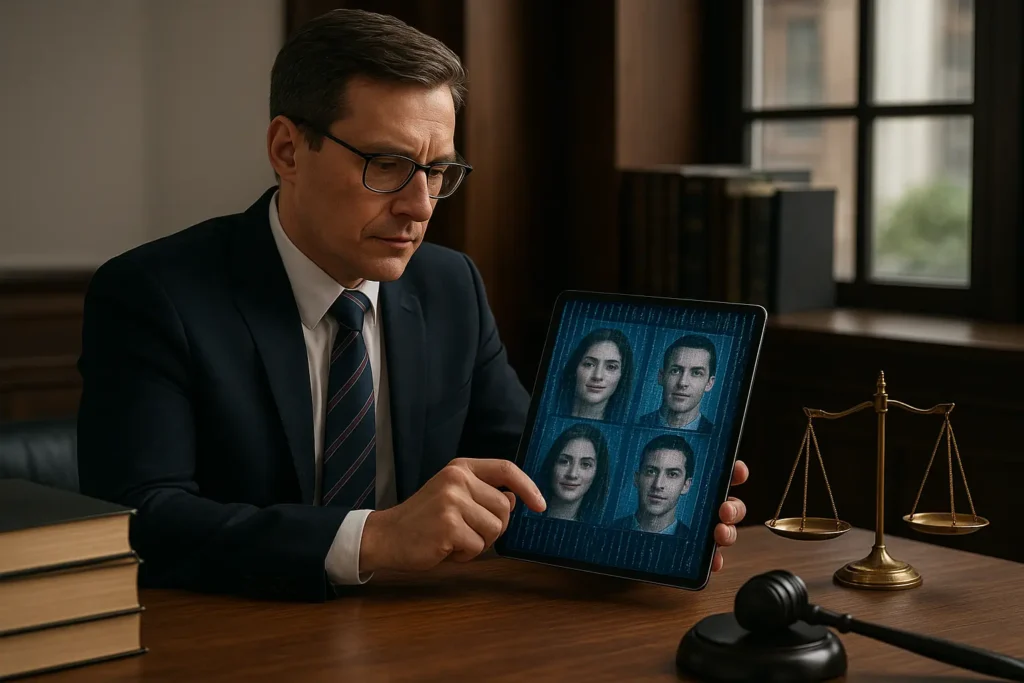A new Texas law is taking aim at the disturbing rise of AI-generated explicit content. Effective September 1, 2023, Senate Bill 1361 makes it a criminal offense to knowingly produce or distribute “deep fake” pornography without the consent of the person depicted.
This law represents a significant step in updating Texas’s legal system to address the dangers of artificial intelligence. For victims, it provides a path to justice. For those accused, it introduces a new area of criminal law with serious consequences, including jail time and a permanent criminal record.
If you are facing allegations related to deep fake content in Plano or Collin County, it is critical to understand the specifics of this new statute and mount a strong defense immediately.
A smartphone displaying a digitally altered face, symbolizing the creation of deep fake content.
*Texas Senate Bill 1361 specifically criminalizes the non-consensual creation and sharing of sexually explicit deep fake videos.*

What is Illegal Under Texas Senate Bill 1361?
SB 1361 created Section 21.165 in the Texas Penal Code, titled “Unlawful Production Or Distribution Of Certain Sexually Explicit Videos.”
The law states that a person commits an offense if, without the effective consent of the person appearing to be depicted, they knowingly produce or distribute by electronic means a deep fake video that appears to depict that person:
- With their intimate parts exposed; or
- Engaged in sexual conduct.
The law provides a clear definition for a “deep fake video” as one created with the intent to deceive, that appears to depict a real person performing an action that did not occur in reality.
What Are the Penalties for Deep Fake Pornography in Texas?
A conviction under this new law is a Class A Misdemeanor.
The penalties for a Class A misdemeanor in Texas are severe and can include:
- Up to one year in a county jail
- A fine of up to $4,000
While this is not a felony, a conviction will still result in a permanent criminal record that can show up on background checks, affecting future employment, housing, and professional licensing. The social stigma attached to a sex-related offense can be devastating on its own.
Common Defenses Against Deep Fake Pornography Accusations
These cases are often complex and hinge on digital evidence and intent. A strong defense is essential. Potential defense strategies include:
- Lack of Knowledge: The prosecution must prove you knowingly created or distributed the deep fake. If you were unaware of the content or its origin, this can be a powerful defense.
- Consent: A complete defense exists if you can prove the depicted individual gave their effective consent for the creation and distribution of the material.
- Misidentification: Challenging whether the evidence actually proves you were the person who created or shared the content.
- Illegal Search and Seizure: If law enforcement violated your rights to obtain the digital evidence, your attorney could file a motion to have that evidence thrown out.
Texas Deep Fake Pornography Law: FAQs
What is the difference between SB 1361 and the federal deep fake law?
Texas SB 1361 is a state law that allows local and state police to investigate and prosecute these cases as a Class A misdemeanor. The new federal law we’ve discussed previously creates federal felonies with much longer prison sentences. It is possible for an individual to face charges at both the state and federal level for the same conduct.
Can I go to jail for just sharing a deep fake, not making it?
Yes. The law explicitly criminalizes both the production and the distribution of non-consensual deep fake pornography. Simply sharing or forwarding the video to others can lead to a criminal charge.
What should I do if I am contacted by police about a deep fake?
Do not speak to them without an attorney present. Politely decline to answer questions and do not consent to any searches of your phone or computer. Then, immediately contact a criminal defense lawyer. Your statements can be misconstrued and used to establish “knowing” intent.
Plano Deep Fake Pornography Defense Attorney
Allegations of this nature are serious and can feel overwhelming. The technology involved is new, and the legal landscape is still evolving. You need a defense attorney who stays ahead of these changes and knows how to challenge digital evidence.
At Starr Law, P.C., we have vast experience defending clients against complex sex-related charges in Collin County. We understand the technical aspects of these cases and how to build an aggressive defense focused on your rights and the specific elements the prosecution must prove.
Don’t let an accusation related to AI content derail your life. The consequences are too severe to face without expert legal guidance.
Contact Starr Law, P.C. today for a confidential consultation. We are ready to defend you. Call us at 214-982-1408.
References
- Texas Penal Code, Section 21.165. Unlawful Production Or Distribution Of Certain Sexually Explicit Videos
- Texas Senate Bill 1361 (88R)
